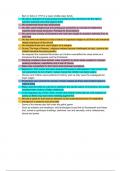Other
William Blake context revision notes
- Module
- Unit 3 - Poetry
- Institution
- PEARSON (PEARSON)
This document also provides an in depth analysis of the life of William Blake. This is to help when writing about him in the exam, thus boosting your AO3 marks
[Show more]



